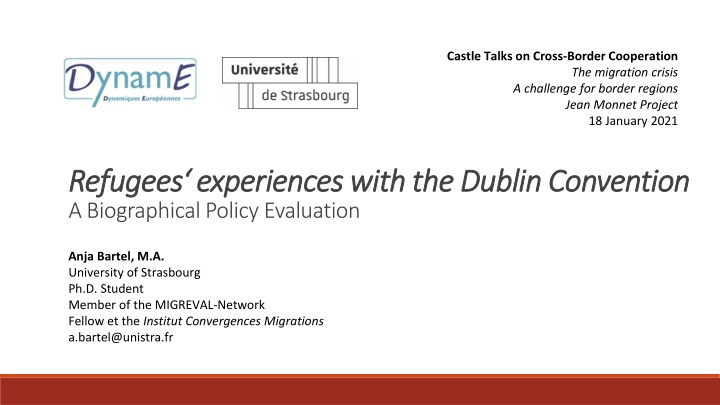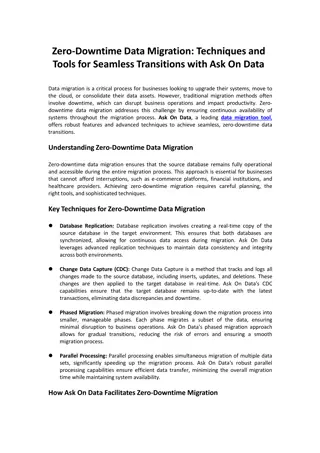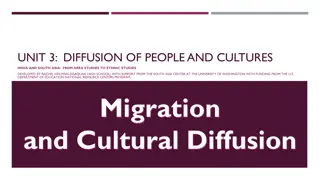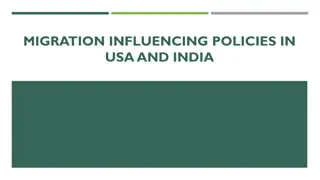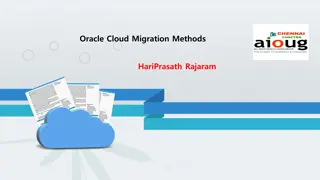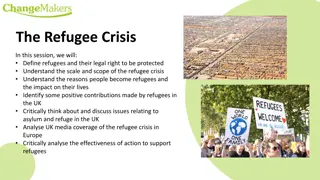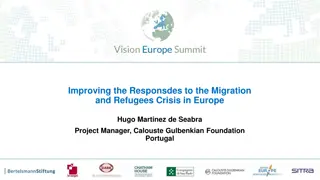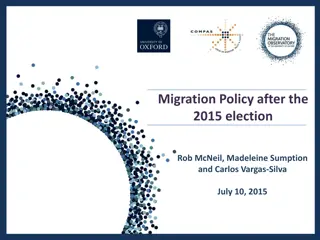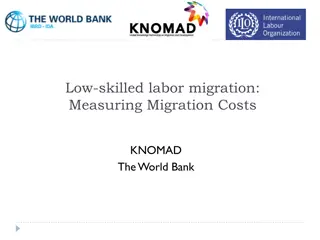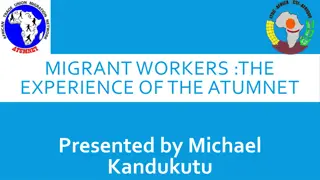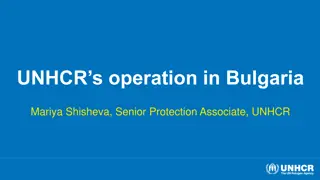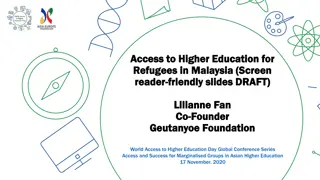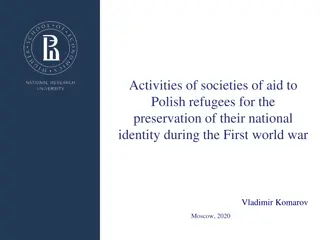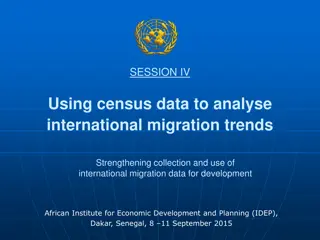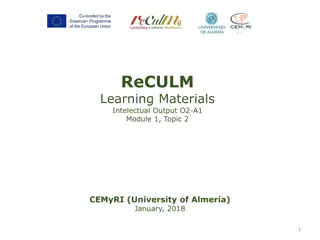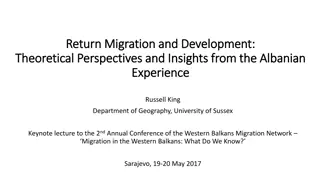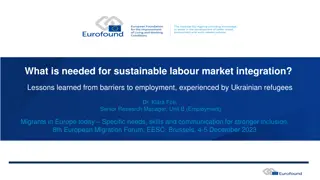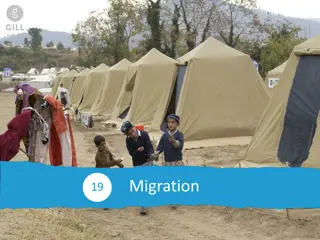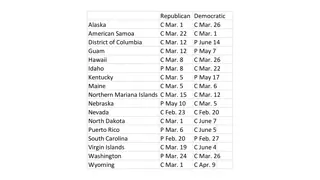Migration Experiences: Refugees' Journey to France under the Dublin Convention
Explore the journey of refugees under the Dublin Convention as they navigate fleeing, arriving, and settling in France. Through biographical policy evaluation, learn about the challenges and decisions faced by individuals like Saddam and Daniel. Discover the process of choosing France as a country of settlement and delve into the integration processes experienced by refugees in this enlightening study.
Download Presentation

Please find below an Image/Link to download the presentation.
The content on the website is provided AS IS for your information and personal use only. It may not be sold, licensed, or shared on other websites without obtaining consent from the author.If you encounter any issues during the download, it is possible that the publisher has removed the file from their server.
You are allowed to download the files provided on this website for personal or commercial use, subject to the condition that they are used lawfully. All files are the property of their respective owners.
The content on the website is provided AS IS for your information and personal use only. It may not be sold, licensed, or shared on other websites without obtaining consent from the author.
E N D
Presentation Transcript
Castle Talks on Cross-Border Cooperation The migration crisis A challenge for border regions Jean Monnet Project 18 January 2021 Refugees Refugees experiences experienceswith A BiographicalPolicy Evaluation withthe theDublin Convention Dublin Convention Anja Bartel, M.A. University of Strasbourg Ph.D. Student Member of the MIGREVAL-Network Fellow et the Institut Convergences Migrations a.bartel@unistra.fr
Outline Context and research perspective Refugees experiences with the Dublin Convention A, The process of choosing France as a country of settlement Fleeing and arriving as a process The case of Saddam The case of Daniel B, Integration processes in France Living as a Dublin The case of Saddam The case of Daniel Conclusion
Context and research perspective Bartel, A., Delcroix, C. and Pape, E. (2020) Refugees and the Dublin Convention . Borders in Globalization Review1(2): 40 52. The Migreval Project - valuation biographique des politiques par les migrants en Europe (https://migreval.hypotheses.org/) The method of Biographical Policy Evaluation (Apitzsch, Inowlocki and Kontos 2008; Delcroix 2001) 30 biographical interviews with people from several countries, having transited through at least one Dublin State before arriving in France (2010-2018)
A, The process of choosing France as a country of settlement Analyzing the flight and the arrival as a process: Only very few of our interview partners fled directly from their country of origin to France. The logic of leaving a place is dominant in the first place. The decision to go to Europe/to France is slowly constructed.
In fact, I asked the people who had been there before us. One of them asked me if I wanted to leave or stay in Italy. I said, "I don't know". It didn t matter, I just wanted to find a place. Then in the morning, they took fingerprints. [ ] So...in fact, the other morning our clothes were very dirty, because for a month I had been wearing them, from Libya until we arrived in Italy. So, I had a friend who was with me. He told me, I have 200 , we can buy clothes. We bought clothes, shoes. Then he told me, in fact, he's from Chad, he told me, "in fact, I'm going to France". I asked him why. He told me, because I speak French. France is better". I don't know if France is better or Italy, I don't know. I said to him, "So, we arrived here together, we can't separate now, because life is not easy, because we are not in Africa, we are in Europe. The caseof Saddam Born in 1991 Left Sudan (2014) Egypt, Libya Mediterranean Sicily, Northern Italy Paris, Calais, Eastern France (2016) (Saddam from Sudan)
The caseof Daniel Luckily, I had a visa, still a valid visa. So, I came to Germany first. Actually, my aim was to go to Germany, not to France, but I didn t know the details of the Dublin agreements, so I arrived in Germany first, made some interviews with some lawyers and they said You have to go to France, because you have a valid visa from France . So unfortunately, I came to France then. I waited for a solution for a while, because I still had the hope to go to Germany or somewhere else, but people said France will be best for you, because otherwise, your process will be longer and longer and probably, they will send you back to France . So, I chose a place in France. Born in 1990 Left Turkey (2014) Germany France (2014) (Daniel from Turkey)
B, Integration processes in France Living as a Dublin case Limited access to social rights Experience of loosing time Difficulty to understand the administrative situation Permanent fear of the police You must wait all this time. One should be clear at least. But they aren t. We don t know what is going to happen [ ] tomorrow. You don t know, if today, because if today, you don t have any money, you don t know what to do, you don t know anybody here. [ ] You can t even leave home, you might stay home, because you don t know anything outside. You are afraid that if you leave, you might meet the police, get in prison, that s things we have in mind. (Ibrahim from Sudan)
B, Integration processes in France The case of Saddam I was lucky. The case of Daniel It is like every day you are waiting. You are making plans for your life. Big plans like, I will start school somewhere or small plans, like I want to go on holidays. I want to start to work. And you can t do anything. [..] Cases like mine don t happen in Germany. Everything works better there. [ ] And also, I don t know, the French culture, the French language, anything about French. I don t like it. Also the German language was much easier for me to learn.
Conclusion Our case studies show that from a certain point, the flight process of our interview partners was mainly affected by their search for a suitable place to stay, a place where it s possible to built one s future (for example through access to language, education or accommodation). In this process of choosing a country, the impact of the Dublin Convention varies. In Saddam's case, it has little influence on his journey to France, in Daniel s case, it hinders him from going to Germany. In general, after having arrived in France, being in a Dublin procedure leads to a substantial prolongation of the waiting period already induced by the asylum procedure, a phase where the stay in France is experienced as uncertain and even unsafe. However, for people who experience their presence in France as their own choice, it is easier to make positive plans (as in the case of Saddam) than for those who experience their presence in France as involuntary (Daniel).
Bibliography Apitzsch, Ursula, Lena Inowlocki and Maria Kontos. 2008. The method of biographical policy evaluation, dans Apitsch, Ursula and Kontos, Maria (eds.), Self-Employment Activities of Women and Minorities. Their Success or Failure in Relation to Social Citizenship Policies. Wiesbaden: VS Verlag f r Sozialwissenschaften, 12-18. Barbou des Places, S gol ne. 2004. Le dispositif Dublin 2 ou les tribulations de la politique communautaire d asile. EUI Working Paper LAW (6). Accessed February 19, 2019. https://hal.archives-ouvertes.fr/hal-01615561/document. Bertaux, Daniel. 2016. Le r cit de vie, 4th edition, Paris, Armand Colin. Bartel, Anja, Catherine Delcroix and Elise Pape. 2020. Refugees and the Dublin Convention. A Biographical Evaluation of Inner European Borders . Borders in Globalization Review 1(2): 40 52. Brekke, Jan-Paul and Grete Brochmann. 2015. Stuck in Transit: Secondary Migration of Asylum Seekers in Europe, National Differences, and the Dublin Regulation. Journal of Refugee Studies 28(2): 145 62. https://doi.org/10.1093/jrs/feu028. Glaser, Barney G. and Anselm Strauss. 1967. The Discovery of Grounded Theory. Strategies for Qualitative Research. New York: Aldine de Gruyter. Sch tze, Fritz (with Kaja Kazmierska). 2014. An Interview with Professor Fritz Sch tze: Biography and Contribution to Interpretative Sociology . Qualitative Sociology Review X(1): 284-329. www.qualitativesociologyreview.org. The Atlas of Migration in Europe: A Critical Geography of Migration Policies. 2019. New York: Routledge. Tiberj, Vincent. 2014. Int gration. In Les 100 Mots De La Sociologie, edited by Serge Paugam. Accessed February 19, 2019. https://journals.openedition.org/sociologie/2484.
